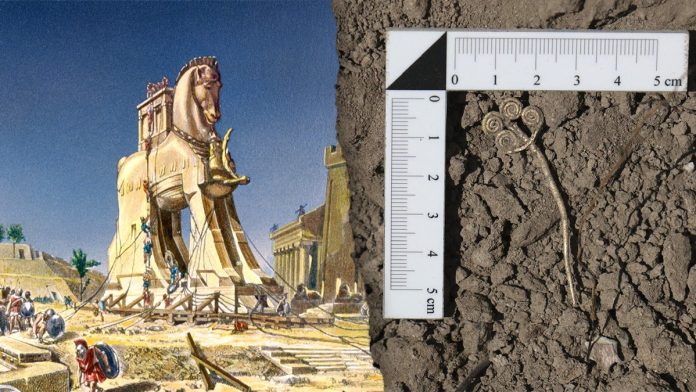NEWYou can now listen to Fox News articles!
Turkish officials recently unveiled a gleaming gold brooch and a rare jade stone in Troy – a remarkable breakthrough that sheds light on the city’s pre-Greek past.
The artifacts were found by archaeologists excavating the Troy archaeological site, located in northwestern Turkey.
Troy was once considered a mythical city, and its remains were first unearthed by Heinrich Schliemann in 1870. The settlement is most famous for being depicted in Homer’s epic poems “The Iliad” and “The Odyssey.”
ANCIENT CIVILIZATION’S GOLD COINS, LUXURY ARTIFACTS UNEARTHED DURING ‘UNPRECEDENTED’ DIG
The Turkish Directorate of Communications announced the new finds in a Sept. 30 release, citing Anadolu Agency.
The artifacts were found in the Troy II settlement layer, which dates back to 2,500 B.C. — some 4,500 years ago.

Archaeologists in northwestern Turkey uncovered a golden brooch and rare jade stone in the remains of the ancient city of Troy. (Bettman via Getty Images; @MehmetNuriErsoy via X)
Turkish officials say the discovery also sheds light on “the long-standing debate regarding the beginning of the Troy II period,” which is usually cited as being between 2550 and 2500 B.C.
RARE ANCIENT GOLD DISCOVERY MADE BY FLORIDA STUDENT AT ARCHAEOLOGICAL SITE
In an X post, Mehmet Nuri Ersoy, the Turkish minister of culture and tourism, lauded the discovery of the brooch.

Excavations at Troy continue to reveal extraordinary finds linking Anatolia with the early Mediterranean world. (LTL/Heritage Images via Getty Images)
“This brooch, the best-preserved of only three known examples in the world, is among the most significant finds of the last 100 years,” wrote Ersoy.
CLICK HERE TO SIGN UP FOR OUR LIFESTYLE NEWSLETTER
He said that jade stones, like the one recently found, were seen as luxury items in antiquity.

The golden brooch and jade stone, found in the Troy II layer, date back roughly 4,500 years. (@MehmetNuriErsoy via X)
The gem was not native to Anatolia, suggesting it arrived through long-distance trade.
All artifacts are planned to be shown at the Troy Museum in Çanakkale, Turkey.

UNESCO calls Troy one of the most famous archaeological sites in the world, rich in cultural heritage and myth. (LTL/Heritage Images via Getty Images)
Troy was added to the UNESCO World Heritage List in 1998.
UNESCO’s website says Troy is considered one of the most famous archaeological sites in the world.
CLICK HERE TO GET THE FOX NEWS APP
“Its extensive remains are the most significant and substantial evidence of the first contact between the civilizations of Anatolia and the burgeoning Mediterranean world,” UNESCO says.





